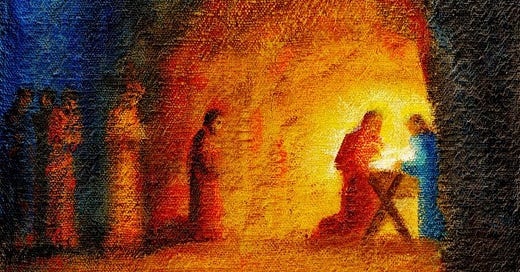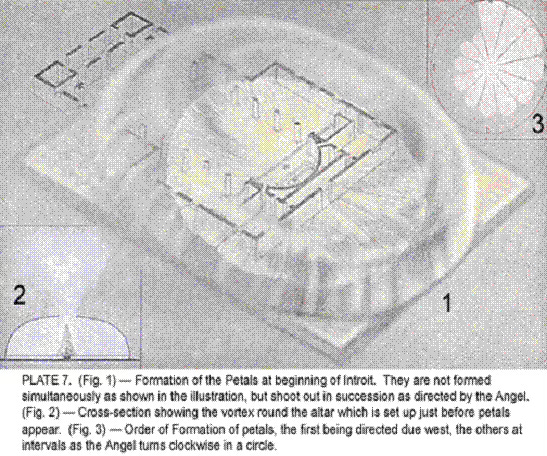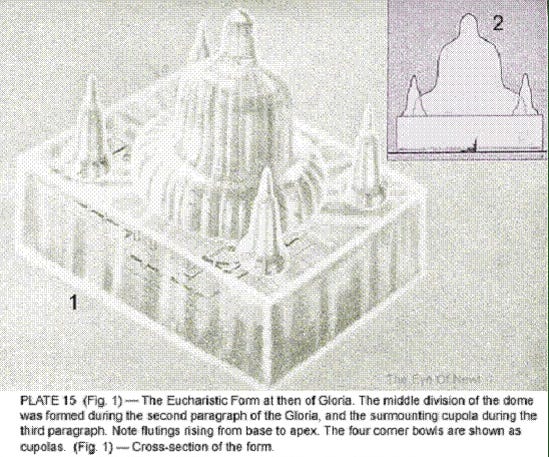“Every man has forgotten who he is. One may understand the cosmos, but never the ego; the self is more distant than any star. We are all under the same mental calamity; we have all forgotten our names. We have all forgotten what we really are. All that we call common sense and rationality and practicality and positivism only means that for certain dead levels of our life we forget that we have forgotten. All that we call spirit and art and ecstasy only means that for one awful moment we remember that we forget.” ―G.K. Chesterton
A blessed and holy Epiphany to all of you!
Liturgically, the church now celebrates Epiphany (Theophany in Eastern Christianity) on the Sunday after Christmas, though traditionally it was observed 12 days after the Nativity on January 6. Being the traditionalist that I am, I much prefer the traditional observance, at least in part due to its numerological significance. But whenever you honor the day, it remains an important feast in the liturgical calendar, honoring as it does the visit of the Magi and the bringing of their gifts.
Zones of Forgetting
Recently, our family visited the local shopping mall in search of an outfit. This was a serious mistake due to the time of year, and the mall was packed with crowds in the throes of holiday shopping. Despite the hubbub and general chaos, I couldn’t escape a a strong inner impression of a spiritual void, a void which I experienced as a sense of complete emptiness bordering on loneliness.
I am no clairvoyant, and yet I am fairly attuned to atmosphere and subtle energies. And the inescapable conclusion I came to was that the shopping mall is a place completely insulated against the presence of higher spiritual beings. It is a spiritual dead zone, if you will, closed off to all that descends from higher planes of existence. At one point during our trip, I actively and consciously tried to make myself aware of higher realities, to remember their existence, but all such thoughts felt completely unreal in such a place.
It is not true to say that a place like our local mall is devoid of all spiritual presences, however. For there were many forces at work—forces of forgetfulness and materialistic thinking. In the anthroposophical mythos, these forces are often associated with the malevolent being Ahriman, who seeks to kill the soul life of humanity and turn us into stones.
Whatever you like to call them, these entities seek to cast a spell of forgetfulness upon all of us, creating a spiritual amnesia that closes us off from the cosmos and our eternal nature. Intensified and carried by electromagnetic forces pulsing through the air, they tantalize us with the glitz and glamor of material goods, the thrill of acquisition, and the ego-driven desire to craft a self-image of our own making. “This is all there is,” they whisper, and the one thing they are determined we must never do is remember who we really are.
It is not only the shopping mall that is host to such entities. These forces of forgetfulness control many modern places, especially the metal and concrete big box stores that populate our cities, and it was their presence I felt as a spiritual void or dead zone. The cloud of forgetting these beings generate is thick enough to restrict the freedom of movement of higher beings, choking them, so to speak, and making their spiritual respiration and freedom of movement nearly impossible.
Just as humans cannot descend to the depths of the ocean unaided due to its immense pressure, cold, and darkness, so too higher spiritual beings find the atmosphere of much of the modern world impenetrable.
Zones of Remembrance
There are, however, places that these entities cannot fully control. They are zones of remembrance and places of spiritual respiration. They are doorways through which higher forces enter and through which impulses of grace descend from above. These places are temples and churches and sacred places.
I was at Mass earlier today. The experience was entirely different than the spiritual void of the shopping mall. The air was thinner and purer, much like the air one breathes in the mountains. Everything which my senses took in was a sign of the presence of the sacred: beautiful choral harmonies, the scent of incense, sacred geometric patterns lining the walls and ceiling, stained glass casting a rainbow of colors on the floor. The presence of spiritual beings was palpable—most of all Christ himself in the Holy Eucharist.
At the beginning of the 20th century, a Theosophist by the name of C.W. Leadbeater wrote a fascinating book entitled The Science of the Sacraments. In the book, Leadbeater describes the spiritual effect of liturgical services as seen through clairvoyant sight. He describes the descending grace of angelic presences and the Eucharist and the ascending devotion of the worshippers as creating thought-forms, or etheric structures, with each part of the liturgical service creating a different facet of a sort of etheric temple, as seen in the example images below.
Leadbeater’s concept of thought-forms simply means that thoughts are things or objects, with form and color and substance as real as any material object (actually, more real), but simply existing on a higher plane of being. Divine worship creates these structures and radiates its benign influence throughout the neighborhood, which, incidentally, is why medieval towns radiated outward from the parish church in the center.
This concept of thought-forms is familiar to anyone who has studied Rudolf Steiner, for he repeats it frequently throughout his works:
Now, the soul world and the spirit world are just as real as the sensory world. Indeed, they are real in a much higher sense. No physical eye can see feelings and thoughts, yet they are real. Just as man by means of his outer senses has the corporeal world before him as an object of perception, so do feelings, instincts, and thoughts become objects of perception for his spiritual organs. Exactly as occurrences in space can be seen with the sensory eye as color phenomena, so can the above named soul and spiritual occurrences become, by means of the inner senses, perceptions that are analogous to the sensory color phenomena. - Rudolf Steiner, Theosophy, Chapter III: The Three Worlds: 6. Thought Forms and the Human Aura
Now, my point is not to explore the work of Leadbeater or Steiner on the reality of thoughts (perhaps I will revisit this in the future). Rather, it is simply to point out that sacred places like shrines, ancient holy wells, parishes, cathedrals, temples, monasteries, and places of spiritual devotion are all portals of grace. They are so many Jacob’s Ladders through which angels ascend and descend freely.
True, entering the clouds of Ahrimanic forgetting is a necessary evil, especially if one must live in an urban environment. And yet this makes it all the more essential to bathe our souls in the cleansing atmosphere of places where higher presences exist—places which help us remember higher planes of being. A sign of the cross made after dipping one’s hand in holy water has tremendous power to dispel the spell of forgetfulness that enshroud the world. A genuflection before the Holy Eucharist is a potent means of remembrance that puts deadening Ahrimanic forces to flight.
Gold, Frankincense, and Myrrh: Instruments of Remembering
The Magi were souls who did not forget. Their eyes were turned toward the heavens in hope and expectation. They did not succumb to the cloud of forgetting which envelops the modern landscape. They journeyed far, following the Christ Star, to pay their homage to the reality of Realities.
Moreover, they brought the Christ child gifts of gold, frankincense, and myrrh. There is a traditional symbolism to these gifts which is quite beautiful and which is entirely legitimate. But in these gifts, I also see the three vows of poverty, chastity, and obedience. These vows are instruments of remembering that allow us to shake off the shackles of mere materiality.
The inner emptiness of poverty creates the space for the gold of divinity to radiate through us. The gift frankincense is chastity manifested in humility and prayer, in true love and devotion, preventing the deadening effect of ego inflation and megalomania. And myrrh is the gift of obedience to the divine call of conscience within.
These gifts were brought to Christ, seated on his Mother’s lap. The Mother and the Son are inseparable. She is the sedes sapientiae, the seat of Wisdom, Sophia, and wisdom is remembering. It is no wonder, then, that Valentin Tomberg’s Our Mother prayer frequently mentions remembering. For our Mother is the spirituality living at the heart of all materiality, at the heart of all form, waiting with longing in her heart for us to bring her the gift of our remembrance.
Our Mother, Thou who art in the darkness of the underworld,
May the holiness of Thy name shine anew in our remembering,
May the breath of Thy awakening kingdom warm the hearts of all who wander homeless,
May the resurrection of Thy will renew eternal faith even unto the depths of physical substance.
Receive this day the living memory of Thee from human hearts,
Who implore thee to forgive the sin of forgetting Thee,
And are ready to fight against temptation, which has led Thee to existence in darkness,
That through the Deed of the Son,
The immeasurable pain of the Father be stilled,
By the liberation of all beings from the tragedy of Thy withdrawal.
For Thine is the homeland and the boundless wisdom and the ail-merciful grace, for all and everything in the Circle of All. Amen.
Dearest Mother, on this Epiphany, help us to be truly wise, and through the gifts of our poverty, chastity and obedience, may we always remember Christ, living in our hearts.






I have always found malls and other “big box” stores deeply unsettling places. I thought it was the lack of sunlight and the crowds of people, but it feels like entering another dimension. It is a place of forgetting, because I don’t think about anything except what I need to buy or what I’m looking for. After a shopping trip, I feel utterly drained of energy. There does seem to be negative forces attached to these places for sure. Thanks for explaining why that might be so!
Thank you, though angels may find it hard to dwell in shopping centers, I experince we can become lighthouses, even to bring light into voids. Few years ago I started to have a conscious attitude while shopping and have had also warmer encounters with people. I also pray Our Father when I enter and try to leave in time before I start to get too tired .